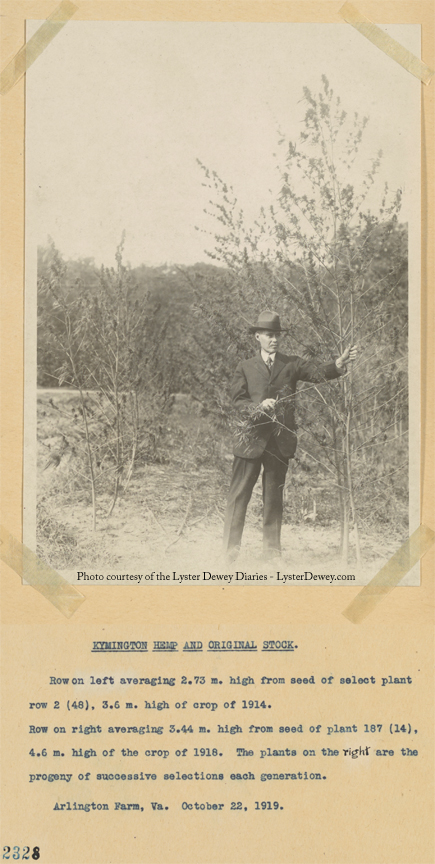Lyster Dewey’s Diaries “What’s Inside?”
 Lyster Hoxie Dewey was born March 14, 1865 in Cambridge, Michigan. He attended, and later taught botany at the Michigan Agricultural College, before moving to Washington, DC to become an assistant botanist at the US Department of Agriculture in 1890. Dewey specialized in research for plant-based fiber production, which led him to study flax, jute, sisal, and hemp.
Lyster Hoxie Dewey was born March 14, 1865 in Cambridge, Michigan. He attended, and later taught botany at the Michigan Agricultural College, before moving to Washington, DC to become an assistant botanist at the US Department of Agriculture in 1890. Dewey specialized in research for plant-based fiber production, which led him to study flax, jute, sisal, and hemp.
Dewey lived most of his life in Washington, DC, in the neighborhoods of Petworth and Shaw. His work commute involved traveling across the Potomac river to Arlington, VA regularly, where his test plots were cultivated.
Lyster Dewey wrote entries in his personal diaries and field notes nearly every day, from 1896 to 1944. He recorded everything from quotidian activities such as where he dined that day, who he met at the office, how his wife and family spent their afternoons; he recorded important current events, such as presidential inaugurations, developments in the many wars that occurred during his lifetime, notes on the weather, modes of transportation and his personal reflections. Often he refers to places in the city that still exist today, such as the Old Ebbitt Grill in Washington, DC; the Petworth and Shaw neighborhoods; parks and churches.
Notably, Dewey recorded in his diaries much of the field observation and study he conducted on industrial hemp”numerous crops of diverse varieties which he grew on U.S. Department of Agriculture (USDA) research plots just outside Washington, D.C. where he lived with his family. Nearly all his entries were written while Dewey lived in the nation’s capital. Indeed, his research trials with hemp were cultivated and conducted on the USDA Arlington Experimental Farm: land in Arlington, Virginia, in the same place where the Pentagon now stands.
The Lyster Dewey diaries reveal much about the period in which he lived, and the early work of the yet nascent U.S. Department of Agriculture, which was formed by President Lincoln in 1862, just three years prior to Dewey being born. When he began working at the USDA at the age of 28, he embarked on what would become a life-long career as a botanist, research agronomist and federal government employee. His diaries give us a glimpse into the life of a man who observed during his lifetime the turn of a century, the American Indian Wars, the formation of 11 states, 16 presidents, the Women’s Suffrage movement, World War I and II, the invention of airplanes, cinema, and the electric guitar, the discovery of the theory of relativity and X-rays. He lived through the Great Depression; and, despite his best efforts he witnessed the prohibition of hemp farming.